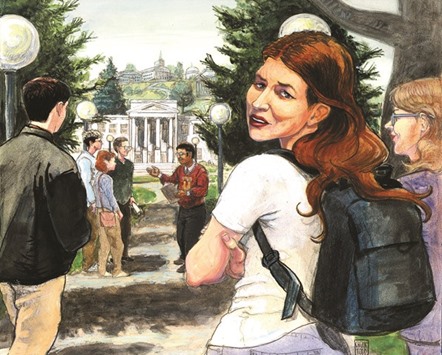Taking a break between high school and university - a gap year - has been trending in recent years in the West. Prince William famously took a gap year to travel and volunteer for worthy causes. More recently, Malia Obama decided to postpone entering university for a year.
The gap year offers an opportunity to make a transition between two stages of a young life - taking a break from formal education and substituting the informal learning from travel and work in the so-called real world.
A few decades back, when it was not quite as common as it is today, I took my gap year. Actually, I took two. An honors student, I certainly was academically prepared to go straight to college. However, I felt I needed a break. Also, unlike many teenagers, I had no work experience. I was not sure what I wanted to do with this seemingly endless road of life, and thus took time off to work in a large corporation and do a bit of travel.
In many ways, it was a rational transition from classes to this environment. This corporate world required some of the same qualities as school, including persistence, punctuality, and math, reading, and social skills. I also spent most of the first half-year taking training and classes, aptitude tests, and learning from others.
As I look back now, I realise that I learned many valuable lessons from that experience.
First, I learned enough about myself to begin to sort out what I wanted to do. I realised I was not suited to a business career. I was good at the work I did, but I could not envision spending a lifetime of days in that environment. I wanted to use my mind and creativity more, and to make a difference in the world. I wanted to have control over what, where and how I did my life’s work, not be so stifled by bureaucratic rules.
Second, it was during my gap years that I began to travel and to learn I could go anywhere. Of course, I had travelled with my family before this, but during my gap years I planned trips and travelled by myself or with a friend.
I planned a couple of trips to California, taking in the counter culture of San Francisco and the celebrity glow of LA. This was the start of my lifelong love of the Golden State.
A trip with co-workers to Las Vegas left me with an impression of how lives can take the wrong path. Being underage (and thus barred from casinos) and totally uninterested in the main activities the city is known for, I spent much of my time there observing people as well as attending concerts and shows. I found the city to be as sad as it was glamorous - a place where people found themselves stranded due to bad choices they had made.
From these trips, I realised that I wanted to travel more throughout the world. I also learned that travel itself was not enough; that being happy with what one was doing 52 weeks a year was central to a happy life.
I learned about hierarchies and, perhaps ironically, the importance of education. The people with higher-level positions, which usually required more education, were clearly treated with more deference. It was also easy to see that college afforded better opportunities in general for more interesting and autonomous work.
It was also in my gap years that I learned the reality of women’s inequality in work and society. Even as a child, I had questioned the limitations placed on women. But as a worker myself, I learned about the daily reality of being treated differently as a woman. For example, although I had scored far higher on a computer aptitude/IT training programme test than the young man who sat next to me in my department, he was called into the training class well before I was. Indeed, my gap years were over and I left for college before being called up for that programme.
Perhaps most important, I learned that human potential must not be wasted; that each of us must strive to do the most with his time and talents; that it was up to each of us to take the initiative rather than wait for someone else to recognise one’s strengths and talents. I could not wait around for someone to invite me into a certain life. I had to make that life myself.
Thus, by the end of my gap years, I had an appreciation of the university experience and what a difference it could make in my life. As my second summer of work drew to a close, I gave notice and entered college, eager to embrace the experience, do my best, and make up for lost time.
I pushed through my undergraduate degree in two years and nine months, my gap years behind me but informing my path ahead.
*Rebecca S Fahrlander ([email protected]) is an adjunct professor of psychology and sociology at the University of Nebraska Omaha.

